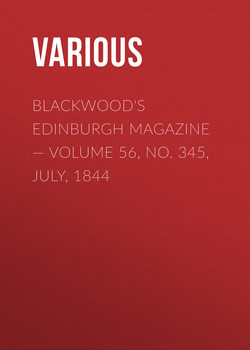Читать книгу Blackwood's Edinburgh Magazine — Volume 56, No. 345, July, 1844 - Various - Страница 3
MEMORANDUMS OF A MONTH'S TOUR IN SICILY THE MUSEUM OF PALERMO
ОглавлениеThe museum of Palermo is a small but very interesting collection of statues and other sculpture, gathered chiefly, they say, from the ancient temples of Sicily, with a few objects bestowed out of the superfluities of Pompeii. In the lower room are some good bas-reliefs, to which a story is attached. They were discovered fifteen years ago at Selinuntium by some young Englishmen, the reward of four months' labour. Our guide, who had been also theirs, had warned them not to stay after the month of June, when malaria begins. They did stay. All (four) took the fever; one died of it in Palermo, and the survivors were deprived by the government—that is, by the king—of the spoils for which they had suffered so much and worked so hard. No one is permitted to excavate without royal license; excavation is, like Domitian's fish, res fisci. Even Mr Fagan, who was consul at Palermo, having made some interesting underground discoveries, was deprived of them. We saw here a fine Esculapius, in countenance and expression exceedingly like the Ecce Homo of Leonardo da Vinci, with all that god-like compassion which the great painter had imparted without any sacrifice of dignity. He holds a poppy-head, which we do not recollect on his statue or gems, and the Epidaurian snake is at his side. Up-stairs we saw specimens of fruits from Pompeii, barley, beans, the carob pod, pine kernels, as well as bread, sponge, linen: and the sponge was obviously such, and so was the linen. A bronze Hercules treading on the back of a stag, which he has overtaken and subdued, is justly considered as one of the most perfect bronzes discovered at Pompeii. A head of our Saviour, by Corregio, is exquisite in conception, and such as none but a person long familiar with the physiognomy of suffering could have accomplished. These are exceptions rather than specimens. The pictures, in general, are poor in interest; and a long gallery of casts of the chef-d'oeuvres of antiquity possessed by the capitals of Italy, Germany, England, and France, looks oddly here, and shows the poverty of a country which had been to the predatory proconsuls of Rome an inexhaustible repertory of the highest treasures of art. A VERRES REDIVIVUS would now find little to carry off but toys made of amber, lava snuff-boxes, and WODEHOUSE'S MARSALA—one of which he certainly would not guess the age of, and the other of which he would not drink.
